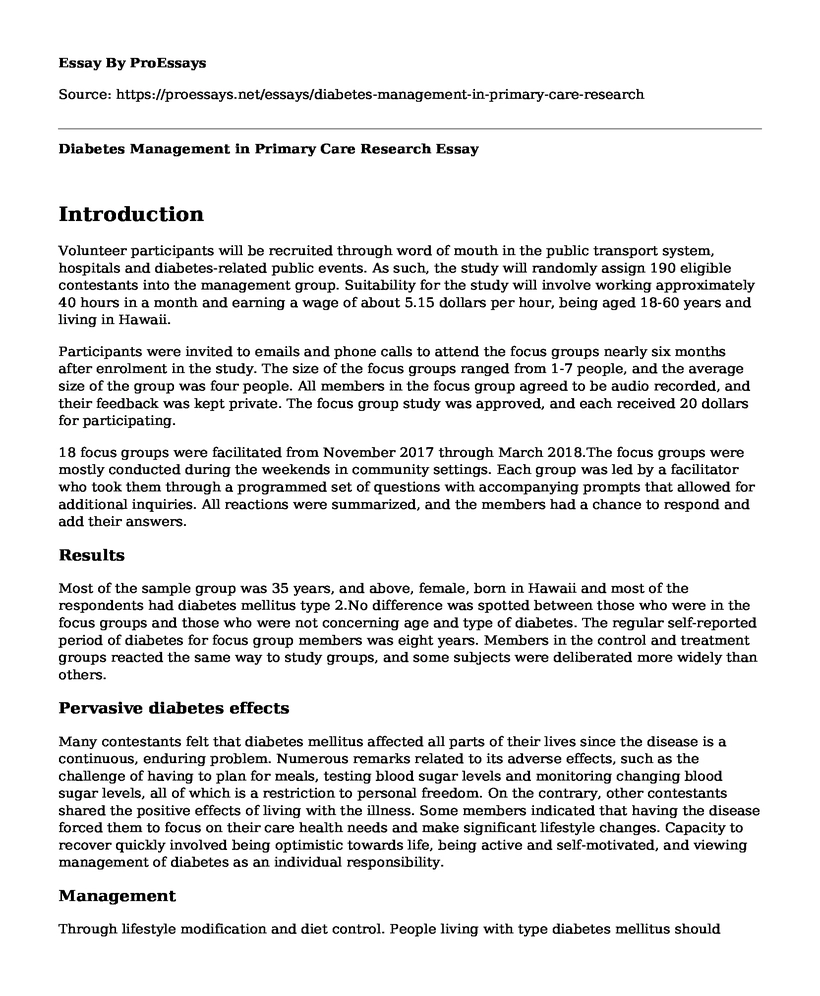Introduction
Volunteer participants will be recruited through word of mouth in the public transport system, hospitals and diabetes-related public events. As such, the study will randomly assign 190 eligible contestants into the management group. Suitability for the study will involve working approximately 40 hours in a month and earning a wage of about 5.15 dollars per hour, being aged 18-60 years and living in Hawaii.Participants were invited to emails and phone calls to attend the focus groups nearly six months after enrolment in the study. The size of the focus groups ranged from 1-7 people, and the average size of the group was four people. All members in the focus group agreed to be audio recorded, and their feedback was kept private. The focus group study was approved, and each received 20 dollars for participating.
18 focus groups were facilitated from November 2017 through March 2018.The focus groups were mostly conducted during the weekends in community settings. Each group was led by a facilitator who took them through a programmed set of questions with accompanying prompts that allowed for additional inquiries. All reactions were summarized, and the members had a chance to respond and add their answers.
Results
Most of the sample group was 35 years, and above, female, born in Hawaii and most of the respondents had diabetes mellitus type 2.No difference was spotted between those who were in the focus groups and those who were not concerning age and type of diabetes. The regular self-reported period of diabetes for focus group members was eight years. Members in the control and treatment groups reacted the same way to study groups, and some subjects were deliberated more widely than others.
Pervasive diabetes effects
Many contestants felt that diabetes mellitus affected all parts of their lives since the disease is a continuous, enduring problem. Numerous remarks related to its adverse effects, such as the challenge of having to plan for meals, testing blood sugar levels and monitoring changing blood sugar levels, all of which is a restriction to personal freedom. On the contrary, other contestants shared the positive effects of living with the illness. Some members indicated that having the disease forced them to focus on their care health needs and make significant lifestyle changes. Capacity to recover quickly involved being optimistic towards life, being active and self-motivated, and viewing management of diabetes as an individual responsibility.
Management
Through lifestyle modification and diet control. People living with type diabetes mellitus should receive medical, nutritional evaluation (Unger, 2013). Lifestyle recommendations should also be encouraged according to the physical and functional capability of an individual living with diabetes.
Conclusion
Overall, diabetes mellitus can be prevented through, weight control, diet control, and lifestyle modifications. Education on the prevalence of this disease is a significant aspect of the control of this epidemic. New medications are being established. However, no treatment is available in the vision of the illness, regardless of new ideas into the pathophysiology diabetes. In this regard, management should be made to improve the quality of life of people with diabetes mellitus.
References
Davalos, C. (2013). Treatment of Early Diabetes. Springer Science & Business.
Fonseca, V., Kirkman, S., Darsow, T., & Ratner, R. (2012). The American Diabetes Association Diabetes Research Perspective. American Diabetes Association, 1380-1387.
Fukunaga, L., & Uehara, D. (2011, February 15). Perceptions of Diabetes, Barriers to Disease Management, and Service Needs: A Focus Group Study of Working Adults with Diabetes in Hawaii. Retrieved from https://www.ncbi.nlm.nih.gov/pmc/articles/PMC3073425/
Kahn, A. (2005). Diabetes: Causes, Prevention And Treatment. Orient Paperbacks.
Olokoba, A., Obateru, O., & Olokoba, L. (2012). Type 2 Diabetes Mellitus: A Review of Current Trends. Oman Medical Journal, 269-273.
Unger, J. (2013). Diabetes Management in Primary Care. Lippincott Williams & Wilkins.
Cite this page
Diabetes Management in Primary Care Research. (2022, Apr 04). Retrieved from https://proessays.net/essays/diabetes-management-in-primary-care-research
If you are the original author of this essay and no longer wish to have it published on the ProEssays website, please click below to request its removal:
- Impacts of Collective Bargaining Agreement to the Public Essay
- Terrorist's Impact on Emergency Management Planning
- Essay Sample on Pediatric-Clinical-Child-Services: Critical for Child Well-Being
- Essay on Honoring the Efforts of All Involved for Accessible Toronto Libraries
- Paper Example on African-American Women's Physical Activity: A Grounded Theory Study
- Essay on US Healthcare Reform: Senate-House Passes Act for Lower Prescription Drug Cost
- Case Study: Acute Pain and Work: Riley's Struggle in the Hospital







